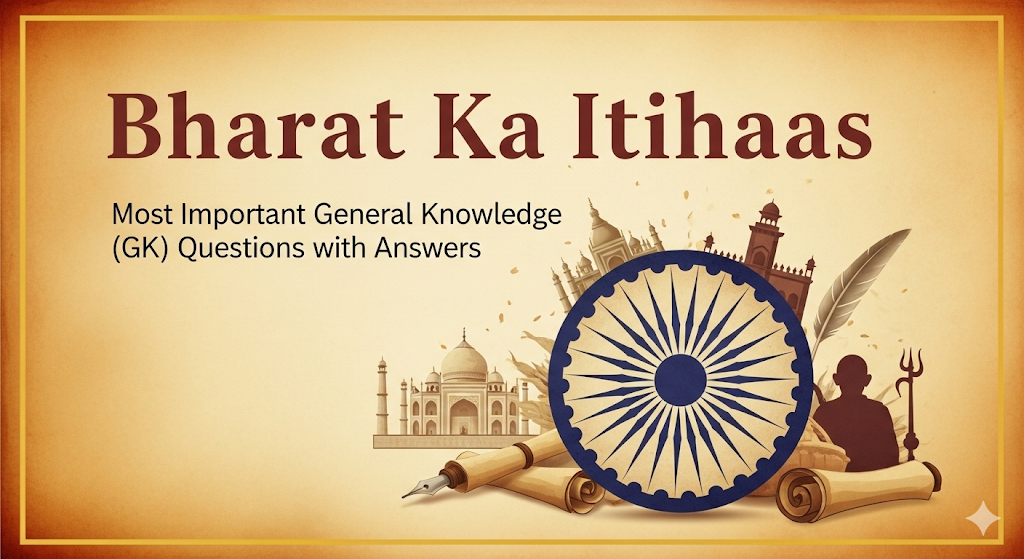Indian history, also called Bharat ka Itihaas, is one of the oldest and richest histories in the world. From the Indus Valley Civilization (3300 BC) to the Modern Republic of India, our history is full of great leaders, freedom struggles, empires, revolutions, and cultural achievements.
For competitive exams like UPSC, SSC, Banking, Railway, Defence, and State PSCs, questions from Indian history are always asked. Students, quiz lovers, and general readers are always looking for important GK questions with answers.
This blog will cover the top 100+ most important GK questions and answers from Indian history — ancient, medieval, and modern.
Ancient Indian History GK Questions (Indus Valley to Maurya Period)
- Q: Where was the Indus Valley Civilization located?
A: Along the Indus River, mainly in present-day Pakistan and northwest India. - Q: Which was the first city discovered in the Indus Valley Civilization?
A: Harappa (1921). - Q: Which script did the Indus Valley people use?
A: They used pictographic script, which is still undeciphered. - Q: Which was the major occupation of Indus Valley people?
A: Agriculture and trade. - Q: Who was the founder of the Maurya Dynasty?
A: Chandragupta Maurya (321 BC). - Q: Who was known as “Devanampriya” and “Priyadarshi”?
A: Emperor Ashoka. - Q: Which king is famous for spreading Buddhism outside India?
A: Ashoka the Great. - Q: Who wrote Arthashastra?
A: Kautilya (Chanakya). - Q: Which was the first capital of the Maurya Empire?
A: Pataliputra (present-day Patna). - Q: Who was the last Mauryan ruler?
A: Brihadratha Maurya.
Medieval Indian History GK Questions (Mughals & Sultanates)
- Q: Who was the first ruler of Delhi Sultanate?
A: Qutb-ud-din Aibak (Slave Dynasty). - Q: Who built the Qutub Minar?
A: Qutb-ud-din Aibak started it, completed by Iltutmish. - Q: Which ruler introduced the Iqta system?
A: Iltutmish. - Q: Who was the only woman ruler of Delhi Sultanate?
A: Razia Sultan. - Q: Who was called “Lakh Baksh” (giver of lakhs)?
A: Qutb-ud-din Aibak. - Q: Who founded the Mughal Empire in India?
A: Babur (1526, First Battle of Panipat). - Q: Who was the greatest Mughal emperor?
A: Akbar the Great. - Q: Who built the Taj Mahal?
A: Shah Jahan, in memory of his wife Mumtaz Mahal. - Q: Who was known as “Zinda Pir”?
A: Aurangzeb. - Q: Which Mughal ruler built the Red Fort in Delhi?
A: Shah Jahan.
Modern Indian History GK Questions (British Period to Independence)
- Q: When did the Battle of Plassey take place?
A: 1757 (British victory led by Robert Clive). - Q: Who was the last Mughal emperor of India?
A: Bahadur Shah II (Bahadur Shah Zafar). - Q: When did the Revolt of 1857 happen?
A: 10 May 1857 (Meerut). - Q: Who was called the “Hero of 1857”?
A: Rani Laxmibai of Jhansi. - Q: Who founded the Indian National Congress (INC)?
A: A.O. Hume (1885). - Q: Who is known as the “Grand Old Man of India”?
A: Dadabhai Naoroji. - Q: Who gave the slogan “Swaraj is my birthright”?
A: Bal Gangadhar Tilak. - Q: When was the Jallianwala Bagh Massacre?
A: 13 April 1919 (Amritsar). - Q: Who started the Non-Cooperation Movement?
A: Mahatma Gandhi (1920). - Q: Who was the last Governor-General of Independent India?
A: C. Rajagopalachari.
Famous Slogans of Indian Freedom Fighters
- Q: Who gave the slogan “Inquilab Zindabad”?
A: Bhagat Singh. - Q: Who said “Do or Die”?
A: Mahatma Gandhi during Quit India Movement (1942). - Q: Who gave the slogan “Jai Hind”?
A: Subhas Chandra Bose. - Q: Who said “Satyamev Jayate”?
A: From the Mundaka Upanishad, later adopted by Independent India. - Q: Who gave the slogan “Simon Go Back”?
A: Lala Lajpat Rai and Indian youth during 1928 protests.
Quick Facts (One-Liners for GK Revision)
- The First Battle of Panipat: 1526 (Babur vs. Ibrahim Lodi)The First War of Independence: 1857.
- Indian National Congress First Session: 1885, Bombay.
- Quit India Movement: 1942.
- India’s Independence: 15th August 1947.
- Republic of India: 26th January 1950.
Tabular Summary – Important Events in Indian History
| Year | Event | Importance |
|---|---|---|
| 1526 | First Battle of Panipat | Beginning of Mughal Empire |
| 1757 | Battle of Plassey | British supremacy starts |
| 1857 | Revolt of 1857 | First War of Independence |
| 1885 | INC Founded | Organized political movement |
| 1919 | Jallianwala Bagh | Turning point in Freedom Struggle |
| 1942 | Quit India Movement | Final call for Independence |
| 1947 | Independence | End of British Rule |
| 1950 | Republic of India | Constitution enforced |
FAQs about Indian History GK
Q1: Why is Indian history important for exams?
Ans: Almost every competitive exam in India includes history GK questions because it helps test knowledge about the nation’s past.
Q2: How to study Indian history effectively?
Ans: Divide into three parts — Ancient, Medieval, and Modern. Focus on key events, dates, battles, and leaders.
Q3: Which books are best for Indian history GK?
Ans: NCERT History (6th–12th), Spectrum’s Modern History, and Lucent’s GK.
Q4: Which period is most asked in exams?
Ans: Modern Indian History (1857–1947).
Indian history is not just about memorizing dates; it is about understanding India’s roots, struggles, and achievements. From Harappa to Mauryas, from Delhi Sultanate to Mughals, and from 1857 revolt to 1947 Independence — every part of history carries lessons for today.
For exam preparation, keep revising these GK Questions and Answers regularly. They are not only useful for exams but also increase your general awareness and confidence.
